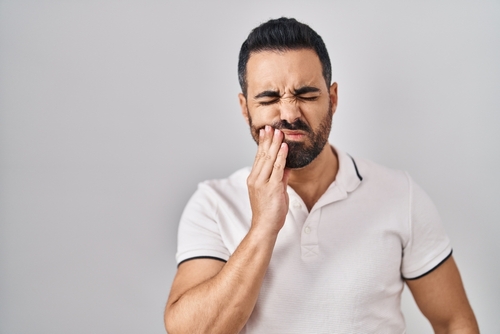Bruxism is the regular grinding or clenching of teeth. This can harm your oral health, and many people do not even realize they have this habit. This can lead to several problems like wearing down tooth enamel, jaw pain, and even tooth fractures. It’s important to understand the causes and effects of bruxism to better avoid oral health complications.
Understanding the Effects of Bruxism on Oral Health
Occasional teeth grinding is not an issue but can cause oral health complications once it becomes habitual. Regular bruxism, especially during sleep, puts too much pressure on the jaw muscles and the temporomandibular joint (TMJ). This pressure can cause jaw pain, headaches, and trouble opening or closing the mouth.
On top of that, grinding can slowly wear down tooth enamel, which is the outer layer that protects teeth. When this layer gets thinner, it makes teeth more likely to decay, feel sensitive, and even break.
The Gradual Erosion of Enamel
Tooth enamel is the hardest part of the human body.
It can handle a lot of pressure, but bruxism slowly wears it down. In severe cases, this wear can expose the softer dentin below which can lead to more sensitivity, pain, and a higher chance of cavities.
You might see signs of tooth wear like flat biting surfaces and shorter teeth. These are signs of damage from bruxism. If these issues are not treated, they can get worse. Not only can this harm oral health, but it can also affect your oral cosmetics and your confidence.
Tooth Fractures
Unlike tooth wear, which happens slowly due to bruxism, tooth fractures are a severe problem that happens immediately. The strong pressure from grinding or clenching can make teeth crack or chip. Sometimes, this can cause serious tooth damage.
These fractures may not be easily seen. They might hide below the gum line or inside the tooth. If you feel pain when you bite, have tooth sensitivity, or get toothaches that don’t go away, it could mean you have a fracture. This shows how important it is to get routine professional dental care.
The Role of Bruxism in TMJ Disorders
The temporomandibular joint, or TMJ, helps your jaw move smoothly. This joint takes a lot of pressure from bruxism. This repeated motion stresses the joint and the muscles around it, often causing TMJ disorders.
TMJ disorders can be painful and cause problems like jaw pain, clicking or popping sounds when moving your jaw, and headaches. They can greatly impact your daily life. Eating may become hard, and the pain can spread to your face, neck, and shoulders. This shows how connected oral health is to your general well-being.
If you are experiencing this, it is essential to seek medical attention as soon as possible.
How Untreated Bruxism Affects Overall Dental Health
Untreated bruxism does not just affect individual teeth but also your overall oral health. Constant grinding can lead to gum recession, making your teeth more at risk for decay and gum disease.
Additionally, teeth that break from grinding can get infections and may eventually be lost. Getting regular dental care and dealing with bruxism quickly is very important. This helps keep your smile healthy and prevents bigger dental issues in the future.
Identifying the Signs of Bruxism Early
Noticing the signs of bruxism is important for acting quickly and stopping further damage. Some signs are clear, like jaw pain or headaches, while other signs can be harder to detect.
Paying attention to any changes in your mouth is key. Look for tooth sensitivity, worn-down teeth, or pain when you bite. This awareness can help you get the right professional help in time.
Night-time Grinding
Sleep bruxism is a type of movement disorder that happens while you sleep. It can be hard to notice as most people do it without being aware. Often, only a partner hearing the grinding sounds will notice.
While you sleep, your body’s muscle activity slows down. However, with bruxism, your jaw muscles can clench and grind a lot. This can disrupt your sleep and your partner’s sleep too. The stress from this can worsen other sleep complications if it is not dealt with.
If you wake up feeling jaw pain, headaches, or earaches, you might have sleep bruxism. It’s a good idea to see a dentist who can help find the cause and suggest the right treatment.
The Path to Diagnosis
Diagnosing bruxism usually starts with a trip to your dentist. They will look at your teeth for any damage, feel your jaw to check for soreness, and ask about any symptoms you have.
If they think you might have bruxism, they may need to do more tests. This could mean taking dental impressions to make custom nightguards. In cases of severe bruxism, they might refer you to a sleep medicine specialist for a sleep study. This test is simple and looks at many different things while you sleep. It checks brain activity, muscle activity, and your breathing.
Treat Your Bruxism Now
Understanding how bruxism affects your oral health is essential for maintaining good oral health. Bruxism can cause problems like enamel erosion and TMJ disorders. If untreated, it can lead to severe dental issues. Finding out early and taking action is crucial to avoid harming your oral health. If you are experiencing symptoms of bruxism, contact the Dentistry of West Bend today!


Recent Comments